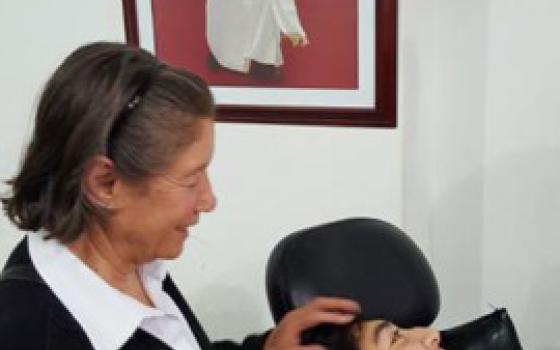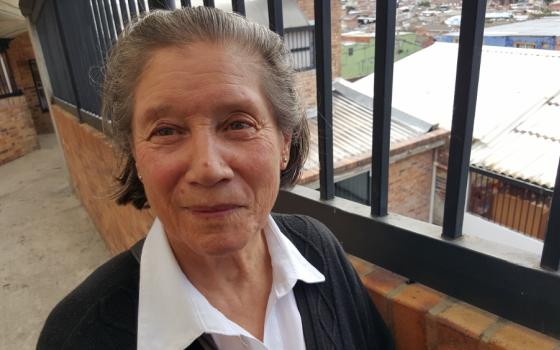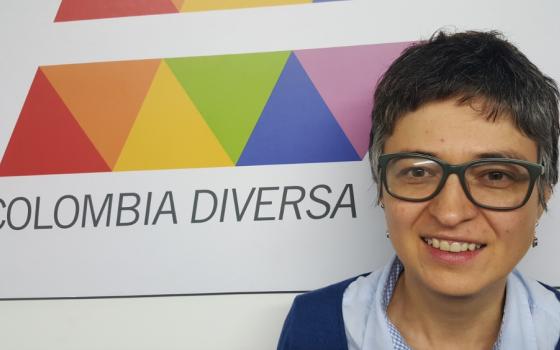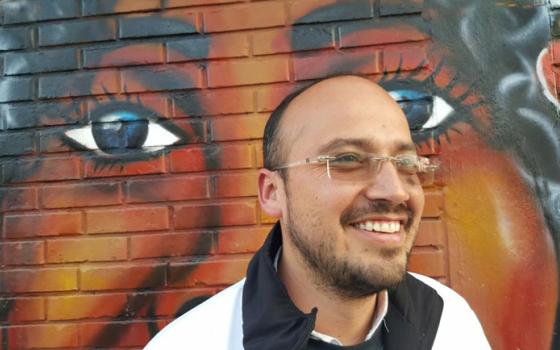When Sr. Valeriana García-Martín speaks of her work at a Bogotá care center for children with physical and mental disabilities, she does so with understandable seriousness.
Hundreds of Colombian families have turned to the center, Asociación Hogares Luz y Vida ("Homes of Light and Life"), to aid their children with special needs. As director of the home, García-Martín has worked tirelessly for more than two decades to build an institution that provides needed care for some of Colombia's most vulnerable children.
García-Martín has done so with the help of the families she serves, the institutional church in Colombia, Colombian Catholic laity, and donors from outside Colombia, including Catholic and non-Catholic churches in the United States.
García-Martín, a 74-year-old native of Spain who works within the archdiocese of Bogotá, the country's capital, compares the work to rebuilding a house — "rebuilding the church of the poor," she calls it. And her own role, she believes, is secondary to the example of Jesus' mercy at work in the world.
But there is another person whose example she thanks: Pope Francis.
For Colombians, especially those who have labored for years working within the social service networks that provide much of the country's safety net for the most vulnerable, the "Francis effect" is real and palpable. In a Latin American country where eight out of 10 people are Roman Catholic, there are understandable bonds of fraternity between Colombians and a pope who speaks Spanish as his first language and hails from the same continent.
The work of García-Martín and others is hard and often goes unappreciated. Children with special needs are a neglected group, and those who work with them are often unheralded. So having a vocal ally who champions the lives, concerns and reality of the most vulnerable and who is the most visible person of the world's largest Christian body is no small matter.
García-Martín's face lights up at the mention of the Argentine pope.
"It's an incredible force for me, his example," she said recently in an interview at the center in Bogotá's San Cristóbal area. Because Francis is less concerned with sitting in the pope's chair and more interested in "searching for the invalid, the suffering," he has given García-Martín "the strength to continue my work."
"He motivates me and fills me with energy."
There are murmurs in some quarters that the "Francis effect" has not yet taken hold among many Catholic clergy in a country where Catholicism tends to be on the more traditional side of the ledger, though Cardinal Rubén Salazar Gómez, archbishop of Bogotá and an appointee of Pope Benedict XVI's, is seen as a theological moderate.
The nonreligious left view the pope favorably, though not fully uncritically. Marcela Sánchez, the director of Colombia Diversa, the nation's most prominent gay rights organization, said in a recent interview with Global Sisters Report that the pope's now-famous declaration about gay people ("Who am I to judge?") was certainly welcome and perceived as sending a more moderate tone than his predecessors.
"Those words helped, yes. There was a lot of media reaction in Colombia to that," she said. "I don't know if it had any practical results, and I don't yet see the practical results, but at least in the social discussion, yes, it's had an effect and was a help."
In recent national debates about the rights of same-sex couples to legally marry — something Colombia's highest court is expected to address later this year — the Catholic church has kept a relatively low public profile in contrast to conservative evangelical Christian bodies, Sánchez said.
While no one expects the Catholic church to embrace marriage between same-sex couples, Sánchez believes that a higher percentage of Catholics would support it than conservative Protestants. (Polls have indicated most Colombians oppose same-sex marriage, though the percentage is lower in Colombia than in some neighboring countries. Polls have also said that a majority of those living in Bogotá support it.)
Sen. Armando Benedetti, a prominent political progressive and human rights figure in Colombia, agrees with Sánchez that the pope's words on tolerance toward gay people have had no real practical effect. However, Benedetti said the words are welcome and "have helped a lot to get people to understand or look to another view and not be as aggressive and ruthless with this population or others who face discrimination."
Benedetti also finds much to admire in the pope's personal style of humility, which Benedetti said has moved him in unexpected ways. "Francis, I like. He fascinates me, he has touched me. He moves me a hundred times a day."
Even with the continued stance of the Roman Catholic church on homosexuality, religious progressives outside Catholic structures find the pope something of a breath of fresh air.
Msgr. Haiver Esneider Perilla Caballero heads the Free Protestant Episcopal Church, an Anglican denomination that does not have formal ties with the U.S. Episcopal Church. His denomination has held to a generally liberal policy about homosexuality, though in Colombia has also had respectful working relations with the Catholic church, particularly in the realm of social service work.
He and others affiliated with the church work among gay and lesbian youth, but also with the homeless and displaced in some of Bogotá's poorest areas, like an area called the Bronx.
"Francis is taking the church back where it should be: close to the poor," he said, noting that the work he and others do is all of a piece, rooted in service. However, that does not make it easier, he said.
Colombia, which has had internal and violent civil conflicts for decades, still has a massive problem with displacement, and many have fled rural areas into urban neighborhoods like the Bronx.
"The problem is giving people a sense of hope," the monsignor said. And that is not easy, looking to restore some sense of normality for people who have been terrorized and displaced by ongoing military conflicts that involve right-wing paramilitaries, Colombian military forces and leftist guerillas.
Perilla and others in poor areas in Bogotá are constantly fighting a battle for money and resources to help Colombia's poor. Words help and are important, especially if they come from a caring pope, Perilla says. But at the end of the day, food has to be served, beds made — and hopes still delayed that the structures for peace and justice in Colombia will one day be put into place. (Colombia's most prominent leftist guerrilla group, the Fuerzas Armadas Revolucionarias de Colombia, have asked Francis to assist in negotiations with the Colombian government, and the idea has the support of some of Colombia's Catholic hierarchy.)
For her part, García-Martín remains optimistic. She said despite the many challenges she and others face, her job is made easier by feeling that in her day-to-day work and vocation, she has this particular pope at her side.
"I like this pope. He gives me hope and love."
[Juan Carlos Davila Valencia in Bogotá contributed to this report. Chris Herlinger is a contributing writer to GSR and NCR. He has reported from South Sudan and Darfur, Sudan, as well as including Haiti, Afghanistan, Pakistan, Israel and the Occupied Territories, Kenya and Ethiopia and Liberia. He is the co-author, with Paul Jeffrey, of books on Haiti and Darfur, published by Seabury, and a third, on global hunger, will be released in September.]




